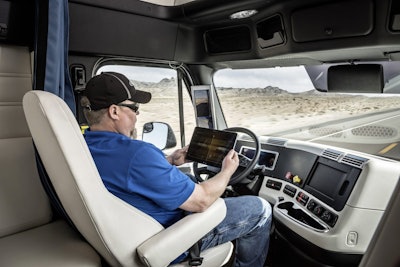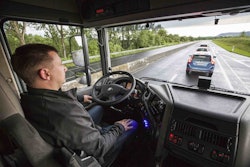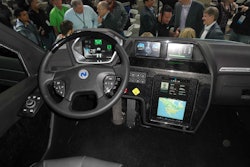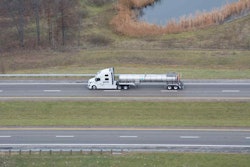
The Southwest Research Institute (SRI) in San Antonio, Texas has begun testing an autonomous truck as part of the Texas Automated Vehicle Proving Ground Partnership – a group that includes Texas A&M Transportation Institute, The University of Texas at Austin’s Center for Transportation Research and 32 municipal and regional partners with a shared interest in mobility and safety challenges related to connected vehicles on public roadways.
“We fully expect to see more automated driving capabilities on Texas roads in the next few years,” Dr. Steve Dellenback, vice president of SRI’s Intelligent Systems Divisionm says. “As these systems move out of laboratories like the ones at Southwest Research Institute, we want to ensure that our engineers are working closely with municipalities, DOTs and universities to create the best infrastructure in terms of networks and roadways.”
The self-driving Freightliner shown in the video from wthr.com can be driven on SRI’s closed course and around campus. At one point, the truck takes sharp evasive action to avoid hitting potholes.
Selected from an applicant pool of more than 60, the Texas AV Proving Ground Partnership joins 10 groups nationwide that will be instrumental in helping the USDOT provide critical insights using big data to further develop guidelines for developing automated vehicle technologies. In working collaboratively, the goal is to offer services that connect people to places of opportunity.
“With five of the nation’s 15 fastest-growing cities in Texas and our population expected to potentially double by the year 2050, Texas must be a leader in new technology that addresses transportation challenges,” Texas Department of Transportation Deputy Executive Director Marc Williams says. “This partnership puts Texas at the forefront of automated vehicle technologies that likely will shape the future of transportation around the world.”
The Texas group will offer a full and varied range of testing environments, from high-speed barrier-separated managed lanes to low-speed urban environments such as university campuses, medical districts and transit bus corridors. Both closed-course facilities and real-world urban and freight test sites will be used in evaluating emerging transportation technologies. By implementing a pilot-learn-scale model of deployment, the Texas team is prepared to safely conduct testing and operations in an iterative manner as the technology develops.
Members of the Texas partnership are contributing their facilities, expertise and talents as a part of a larger Texas network of proving grounds and test-bed sites. Proving grounds offer controlled environments on research campuses where the complete life-cycle development of AVs can be assessed. Urban and freight test beds in the following cities offer real-world environments where a variety of scenarios may be explored:
- Austin Area – Austin-Bergstrom International Airport and Riverside Drive corridor
- Houston Area – Texas Medical Center, Houston METRO HOV lanes, and Port of Houston
- Dallas/Fort Worth/Arlington Area – UTA campus, Arlington streets, I-30 corridor and managed lanes
- San Antonio Area – Fredericksburg Road/Medical Drive corridor and VIA Metropolitan Transit system
- El Paso Area – Tornillo/Guadalupe Port of Entry











